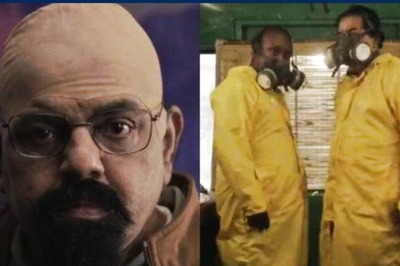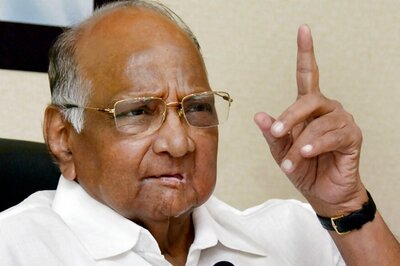
views
Istanbul: Afghanistan urged Pakistan on Tuesday to "move beyond words" and take concrete steps to curb Islamist militants which it said were a threat to both countries.
The two neighbours were holding their first talks since the assassination in September of the chief Afghan peace negotiator. The meeting, hosted by Turkey, aims to heal a rift that is undermining prospects of ending the Afghan war.
Afghan President Hamid Karzai and his Pakistani counterpart Asif Ali Zardari met along with Turkish President Abdullah Gul while their army chiefs consulted ahead of an international conference on Afghanistan on Wednesday.
Afghan Deputy Foreign Minister Jawed Ludin told reporters on the sidelines of the meeting in Istanbul that Afghanistan and Pakistan had been trying for several years to build trust "but I think we have failed to see results on the ground".
"So we are at a stage where we need to move beyond words, beyond expressions of commitments. We need to get to a stage where we actually do concrete things that will address our concerns with regards to our security," he said.
Afghanistan accuses Pakistan's Inter-Service Intelligence (ISI) agency of supporting Taliban insurgents who have launched a string of attacks in recent months as the United States and its allies prepare to pull out most combat troops by the end of 2014.
Kabul broke off talks with Islamabad after the assassination of Afghan peace envoy and former president Burhanuddin Rabbani, which it blamed on Taliban insurgents it said were based in the Pakistani city of Quetta.
Ludin said Islamabad's cooperation was vital to the security of Afghanistan but also to Pakistan - which has also faced a wave of bombings by the Pakistani Taliban.
"So the message we are really bringing today is to tell Pakistan, 'Look, you're not doing us a favour by helping with bringing peace and security to Afghanistan ... It's a question of peace and security in Pakistan that's also suffering at the hands of terrorism.'"
Islamabad, which denies supporting the Taliban, has complained that insurgents from the Tehrik-e-Taliban Pakistan (TTP), or Pakistani Taliban, have been using Afghanistan as a base from which to launch attacks in Pakistan.
It has also stressed the need to hold talks with insurgents to try to reach a political settlement to end the war.
But Rabbani's assassination reduced hopes that talks might offer a way forward, though the United States has said it remains open to reaching an accord with insurgents ready to sever ties with al Qaeda, renounce violence and respect the Afghan constitution.
Karzai, underlining Afghan suspicions that Islamabad is backing the insurgents, had said after Rabbani was killed by a suicide bomber posing as a Taliban peace emissary, that any negotiations should be held directly with Pakistan instead.
On Tuesday, Karzai's spokesman reiterated Afghan concerns that Pakistan was supporting the militants.
"President Karzai's message is that Pakistan needs to end using radicalism as a tool in their politics," said Emal Fayzi.
Pakistan had no immediate detailed comments on the talks though Interior Minister Rehman Malik said they were "very good".
Pakistan Army chief General Ashfaq Pervez Kayani, who held separate talks in Istanbul with Afghanistan army chief General Sher Mohammad Karimi and the head of the Turkish military, declined to comment.
The army dominates foreign and security policy in Pakistan.
Asked about Pakistan's initial response at the meeting, Ludin said: "Te test remains to be taken and that is to the extent that we can actually see concrete steps to help with the peace process".
He also said Afghanistan wanted Pakistan to deal with the Haqqani network - a powerful insurgent group which says it owes allegiance to the Afghan Taliban, but has traditionally been seen as close to the ISI.
Pakistan denies supporting the Haqqani network and attributes its lack of action against the group to the fact that its army is already overstretched fighting Pakistani Taliban militants and others.
A senior US administration official said on Monday that Pakistani action against the Haqqani network did not necessarily need to be military.
Instead it would include "ensuring that intelligence doesn't go to the Haqqani network" and "that they don't benefit from financial resources or flow of finances".
The trilateral talks will be followed by a regional conference on Afghanistan to be attended by Indian Foreign Minister S.M. Krishna and their counterparts from France and Germany, among others.
US Secretary of State Hillary Clinton cancelled her trip because of the ill health of her mother.




















Comments
0 comment